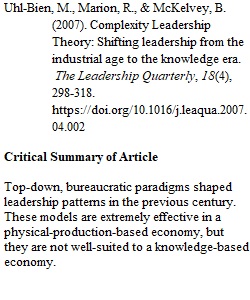


Q Annotated Bibliography 1 New Attempt • Due No Due Date • Points 30 • Submitting a file upload Due: Friday Module 1 To access the assignment instructions, click on the following document: Annotated Bibliography. Download Annotated Bibliography. You will find the articles for the annotated bibliographies at the bottom of the Module 1 Lecture. For reference, they are also listed here: Write your annotated bibliographies in response to both the articles listed below Duck, J. (1993). Managing Change: The Art of Balancing. Harvard Business Review. Nov/Dec 93, 71(6), 109-118. Uhl-Bien, M., Marion, R., & McKelvey, B. (2007). Complexity leadership theory: Shifting leadership from the industrial age to the knowledge age. The Leadership Quarterly, 18(4) 298-318. To upload your completed work, click on the Start Assignment button and then the Submit Assignment button.
View Related Questions